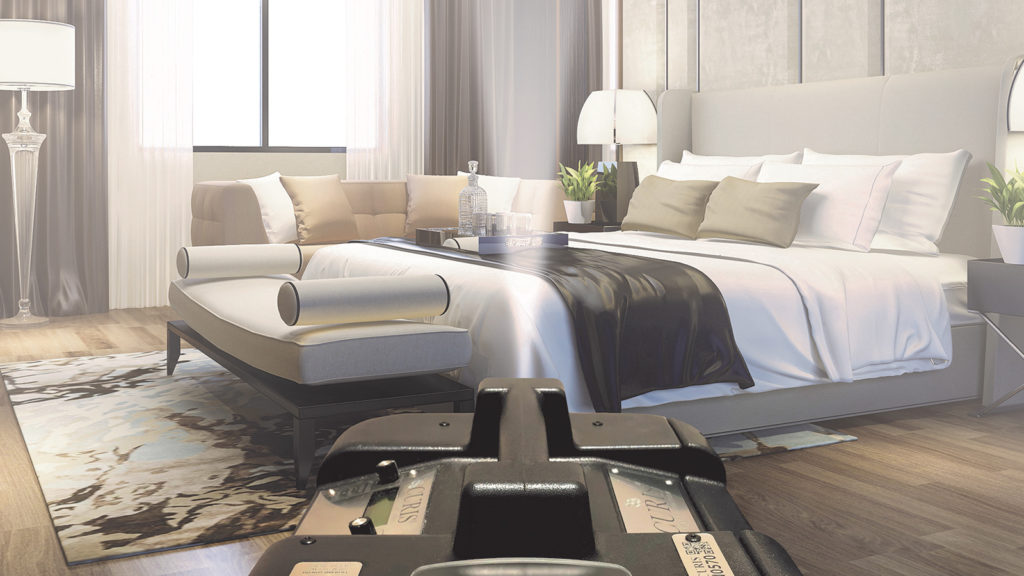Sponsored Content By Midwest Pathogend Services
Midwest Pathogend Services discovers additional uses for CURIS® System for hotel operations and provides an integrated pest management protocol for hotel operators.
Hotels and resorts throughout the country were repurposing their facilities to become centers for COVID-19 patients and frontline healthcare workers. The unforeseen consequence of this interim repurposing makes these properties even more vulnerable to a common issue for bed bug infestations. With any influx of new occupants, there will be an increase in the number of bed bug introductions.
Before COVID-19, hotels benefited from daily inspections by housekeeping staff, alerts from guests and quick action from contracted pest management professionals (PMPs) to treat bed bug incidents. If left untreated, infestations can quickly grow exponentially and will spread throughout properties. As the University of Kentucky College of Agriculture and Department of Entomology describes,
“Bed bugs are resilient. Nymphs and adults can persist months without feeding, which is unusual for most insects. The ability to survive without a blood meal is longer at cooler temperatures – potentially up to a year or longer at 55°F or less. In temperature-controlled buildings, a more typical duration without feeding is about one to four months. Consequently, it is usually impractical to leave homes unoccupied in hopes of ‘starving’ an infestation. When infested dwellings such as apartments are vacant, bed bugs often disperse to nearby units, or reduce their activity until the unit is reoccupied. Bed bugs are active mainly at night. During the day, they tend to hide close to where people sleep. Bed bugs prefer to hide close to where they feed, but if necessary will crawl longer distances in search of a meal. Initially they tend to be concentrated around beds, sofas and other sleeping and resting areas – but if infestations are allowed to persist, they may disperse elsewhere, making elimination more difficult. Their flattened bodies enable them to fit into tiny crevices no wider than a toothpick. Bed bugs don’t have ‘nests’ like ants or bees, but do tend to congregate in habitual hiding places like mattresses, box springs, bed frames and headboards. Characteristically, these areas are marked by dark spotting and staining, which is the dried excrement of the bugs. Also present will be hatched and unhatched eggs, and tan-colored ‘skins’ shed by developing nymphs. Another possible sign is rusty or reddish smears on bed sheets or mattresses from blood-engorged bed bugs that have been crushed. Although it’s often stated that bed bugs have a telltale ‘buggy’ odor, the smell is seldom apparent except in extreme infestations and should not be relied upon for detection.”
Delaying treatment and the failure to implement preventive programs simply worsen the inevitable. Bed bugs will expand throughout the facility, causing undue harm and stress to occupants and team members, while resulting in extensive remediation expense. Compounding the problem is that bed-ridden COVID-19 patients are a prime, unmoving food source for bed bugs, whose bites, when repeatedly scratched, can result in further infections. Bed bug prevention can mean the difference between treating a few rooms versus expensive, building-wide treatment.
Finally, when your COVID-19-related occupants leave, your bed bugs will not. It is important to note that even non-repurposed hotels, as a result of reduced census, may start noticing bed bug issues spread through their properties as existing bed bugs are forced to move throughout the property to find blood meals in occupied rooms.
A Proactive Approach Using an Integrated Management System
In trying to control the delicate balance between the short-term needs of preventing the spread of COVID-19 and securing public safety through responsible pest control, the unintended hazards of deferring treatment of bed bugs has been recognized. Even in the short and medium-term, performing field-proven preventive treatments now will reduce the contact time between occupants, team members and pest management. Financially, early adoption of bed bug prevention will save hotel operators unnecessary pest control costs, guest compensation, team member time, legal expense and reduced census and lost room revenue resulting from negative social media.
Midwest Pathogend Services has provided best practice guidelines using an innovative technology that is safe to use on electronics and leaves no residue, while providing a proactive approach to serving both disinfection needs and controlling certain microorganisms such as bed bugs.
A New Approach for Hotel Operators:
The archaic approach of reactive treatments is simply not an effective long-term strategy to control bed bug infestations.
Left unaddressed, bed bugs can spread to infest entire hotels over a several-month time period. This results in difficult, extensive and costly treatments, significant facility-wide disruption and unnecessarily prolonged interactions with pest managers, which is especially problematic during today’s COVID-19 pandemic. Adopting a preventive strategy can potentially save hundreds of thousands of dollars in unwanted bed bug treatment costs. Using well-established COVID-19 hygiene guidelines, Midwest Pathogend Services has implemented field-proven preventive programs that will significantly reduce bed bug incidents. These proactive measures will ensure the well-being of the occupants, reduce operational expenses, protect the facility against expensive remediation costs and reduce ownership liability.
Another opportunity for hotel operators is when COVID-19 restrictions relax and hotels are undergoing sanitization before returning to normal guest service. At that time, they should seriously consider a hotel-wide assessment, including bed bug detection, treatment if necessary and implementation of proven preventive strategies. These measures are significantly easier to enact, less disruptive and less expensive while the hotel is unoccupied.




